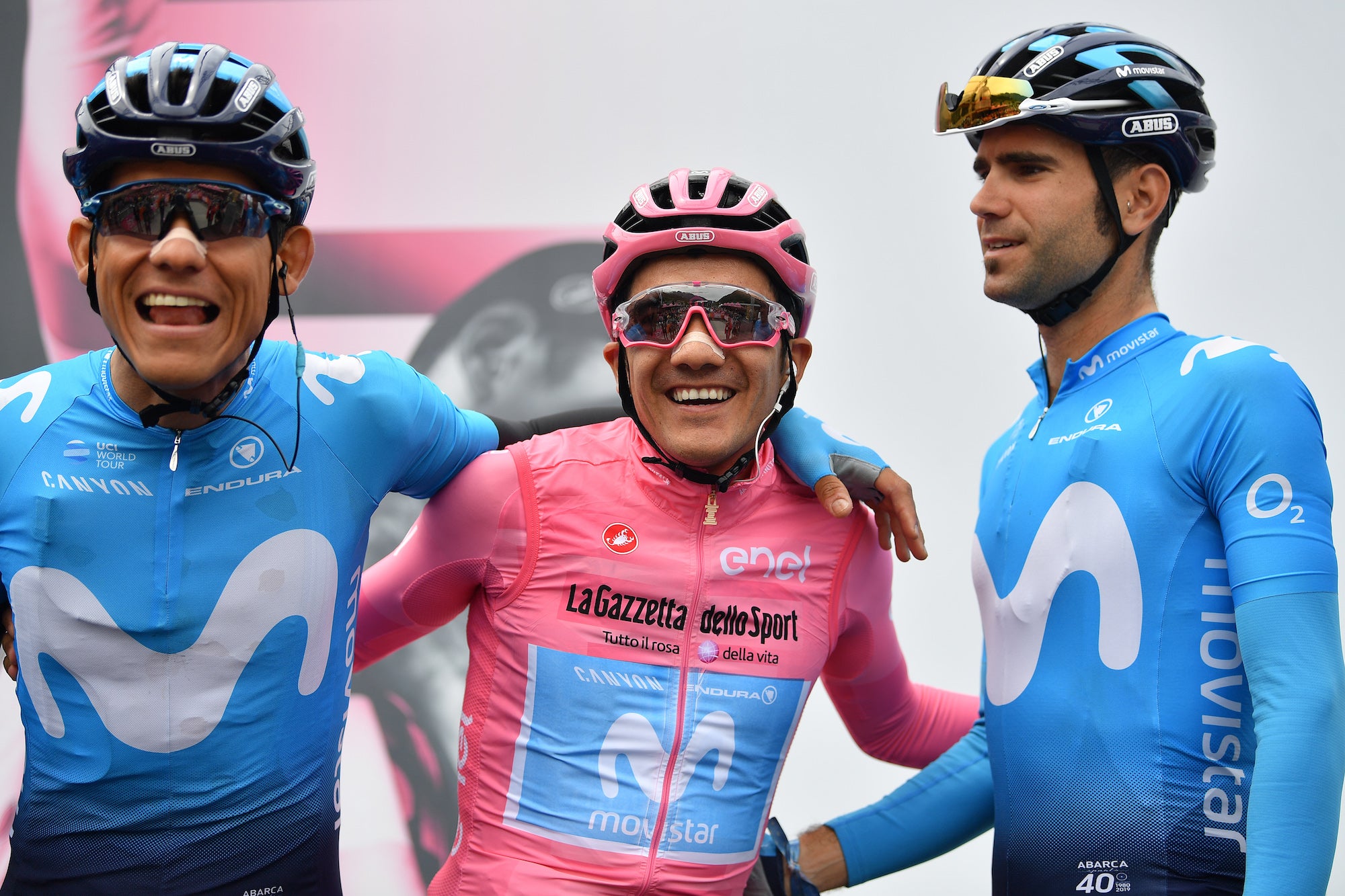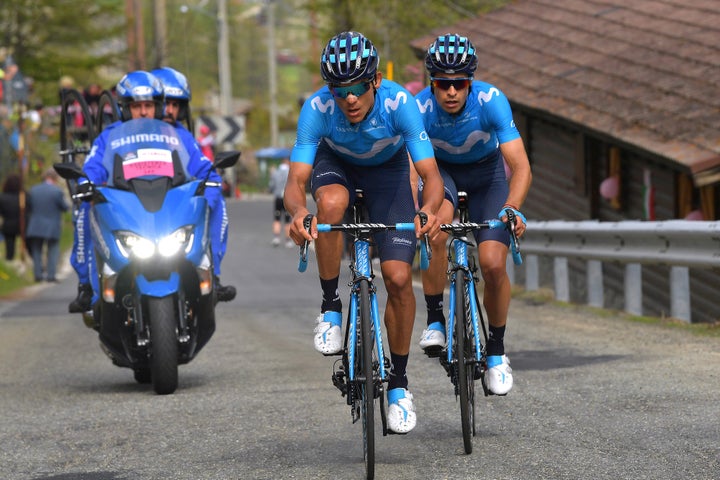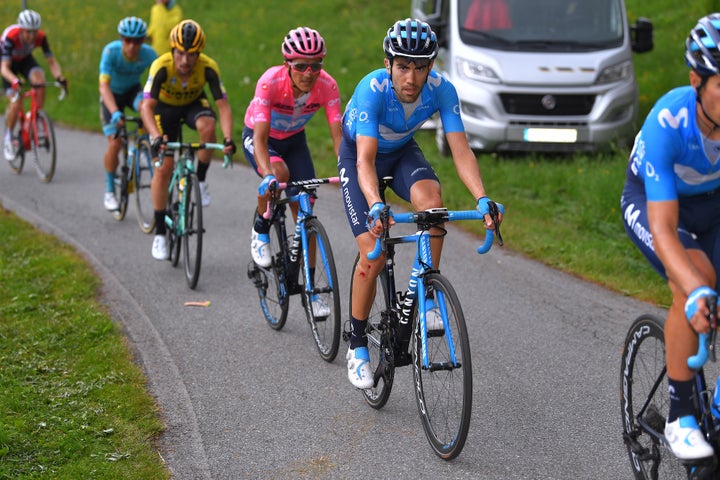Tactical masterclass: the old-school thinking behind Movistar's Giro dominance

ANTHOLZ-ANTERSELVA, ITALY - MAY 29: Start / Andrey Amador Bikkazakova of Costa Rica and Movistar Team / Richard Carapaz of Ecuador and Movistar Team Pink Leader Jersey / Lluis Mas Bonet of Spain and Movistar Team / Team Presentation / during the 102nd Giro d'Italia 2019, Stage 17 a 181km stage from Commezzadura to Antholz-Anterselva 1635m / Tour of Italy / #Giro / @giroditalia / on May 29, 2019 in Antholz-Anterselva, Italy. (Photo by Justin Setterfield/Getty Images)
ANTERSELVA, Italy (VN) — Movistar is throwing away the calculator and using old-school racing tactics to win the 2019 Giro d’Italia.
In a sport that’s largely evolved into a calculation game, where power meters and computer-packing coaching gurus too often dominate tactics, the Spanish team is using a more traditional playbook to upend the Giro.
“Tactically, sometimes you need to look less at numbers and lay down a plan,” said Movistar’s Max Sciandri. “On this team, you can play more as a director and rely less on the calculations by coaches. It’s more tactics and less numbers on this team.”
Despite significant early TT losses in the first half of the Giro, Movistar has been slowly chipping away at its rivals by sending riders on the attack and organizing their helpers to be in the right place in key moments.
By attacking often and early since the mountains turned upward at the end of last week, Movistar has largely been able to neutralize cagey veteran Vincenzo Nibali (Bahrain-Merida) and reverse the major time trial gains of Primoz Roglic (Jumbo-Visma) to take control of the pink jersey.
Movistar did it again Wednesday at the end of what appeared to be a rather routine stage. Mikel Landa attacked, and pink jersey Richard Carapaz countered in his wake. Not only did the action put pressure on their rivals, it gave Carapaz a few extra seconds advantage heading towards the final decisive weekend.
“The ambiance within the team is phenomenal,” Carapaz said. “The entire team is helping one another. We cannot demonstrate in a better way than what happened [Tuesday] on the Mortirolo, and how we raced the stage. It was a 10.”
A frustrated Nibali has all but admitted his chances of winning the Giro have slowly slipped away and he recognized Carapaz’s stubborn grip on pink.
A week ago, no one was counting Movistar’s pair of climbers as likely Giro winners. Carapaz was more than three minutes behind Roglic. Landa was nearly another two minutes adrift.
As soon as the road tilted upward, Movistar has deftly played off its rivals and counted on its strength in numbers in the mountains to turn the Giro upside down.
“From stage 9, we’ve nibbled back the five-six minutes from Roglic with good execution,” Sciandri said. “Normally at the Tour de France, it would be end of story with those kinds of differences.”

Luck on side
A few things have turned Movistar’s way. Pre-race favorites Simon Yates (Mitchelton-Scott) and Miguel Angel Lopez (Astana) have both struggled with health issues, crashes and mechanicals. Tom Dumoulin (Sunweb) crashed out early, meaning that Movistar could largely focus on Roglic and Nibali.
And Roglic, racing to win a grand tour for the first time, seemed obsessed on Nibali. And Nibali, who is perhaps in the best form since winning the 2014 Tour, seemed to lose focus on the larger threat posed by Movistar’s early moves by getting into a squibbling war with Roglic on who should be doing the work. In the first key battles in the mountains last weekend, as Roglic marked Nibali’s wheel, and Nibali fumed, Carapaz and Landa both darted away and all but erased their time trial losses in a few key attacks.
“Nibali was doing the hard work of dismantling Roglic, and we took advantage of that,” Sciandri said. “Nibali did the hard work and we finished it off.”
A key moment came when Carapaz attacked behind an early Landa move last Friday to Lago Serrù in stage 13, and took back nearly two minutes. The next day, Carapaz bolted away from everyone to take the pink jersey to Courmayeur.
Another key part of the Movistar strategy during this Giro is to give their riders the freedom to move when they want. Carapaz’s race-changing attack over the Cat. 1 Colle San Carlo that caught the favorites by surprise in stage 14 was not part of the day’s plan. Sciandri said he expected the race to stay together until the final hump to the line.
Movistar boss Eusebio Unzué said Sciandri along with head sport director Chente García devise the day’s tactical plan, but they also allow their riders to read the race and pounce if they feel it’s the right time to move.
“We all work together to construct the tactical plan. From Chente to Max and even I can chip in a bit of my expertise,” Unzué said. “You can make a plan, but in cycling, you must also be able to improvise and react in the right moment.”
That kind of unpredictability is what makes the Giro so much more interesting than the highly controlled Tour de France.

A different beast
In the Tour, an established GC captain with nearly two minutes’ lead to his most dangerous rivals like Roglic had in this Giro would almost turn the race into a fight for the podium.
“When there is a big leader like Froome, and during this decade, he’s almost never struggled, and when he has such a strong team around him, it results in a very controlled race. And when the interests of other teams are piled on, well, the Tour is much more controlled,” Unzue said. “The Giro is usually much more wide open, and it’s a type of cycling that’s more appealing to everyone.”
The Giro is a different beast, and Movistar has been able to patiently dismantle Roglic and take control of the pink jersey with just five days of racing left to go.
Just look at what happened in Tuesday’s race-making stage over the Mortirolo. Movistar knew that Nibali was going to try to blow up the race. So Movistar figured out a plan that the sport directors thought would provide pink jersey Carapaz with support in every scenario.
The team slotted Andrey Amador into the day’s breakaway. It designated riders such as Jasha Sutterlin, José Joaquín Rojas and Lluís Mas to deliver Carapaz to the base of the climb. Héctor Carretero and Antonio Pedrero paced Carapaz and co-captain Mikel Landa midway up the climb. So when Nibali eventually attacked, Movistar had numbers to keep the dangerous Italian on a short leash. Amador was waiting near the top to help reel in Nibali, and pace the leaders to the line.
It was near-perfect execution that neutralized Nibali and opened up more time to Roglic, and all but sealed Carapaz with real chances of delivering Movistar’s first grand tour victory since 2016.
“We’ve been able to do some good things in this Giro,” Sciandri said. “It’s always going to come down to the guy with the calculator saying you did the Mortirolo with this time and this amount of watts. But we had a plan and this is what we are able to do on this team.”
Movistar did it again Wednesday, putting Landa and Carapaz in position to attack and move.
“When you’re out there and you’re racing, you forget those numbers,” Sciandri said. “It’s your heart and soul and legs and spirit and motivation. That’s what gets you going.”
It’s that unique blend of old-school racing tactics with less reliance on numbers that’s opening the door for Carapaz to possibly become Ecuador’s first grand tour winner.